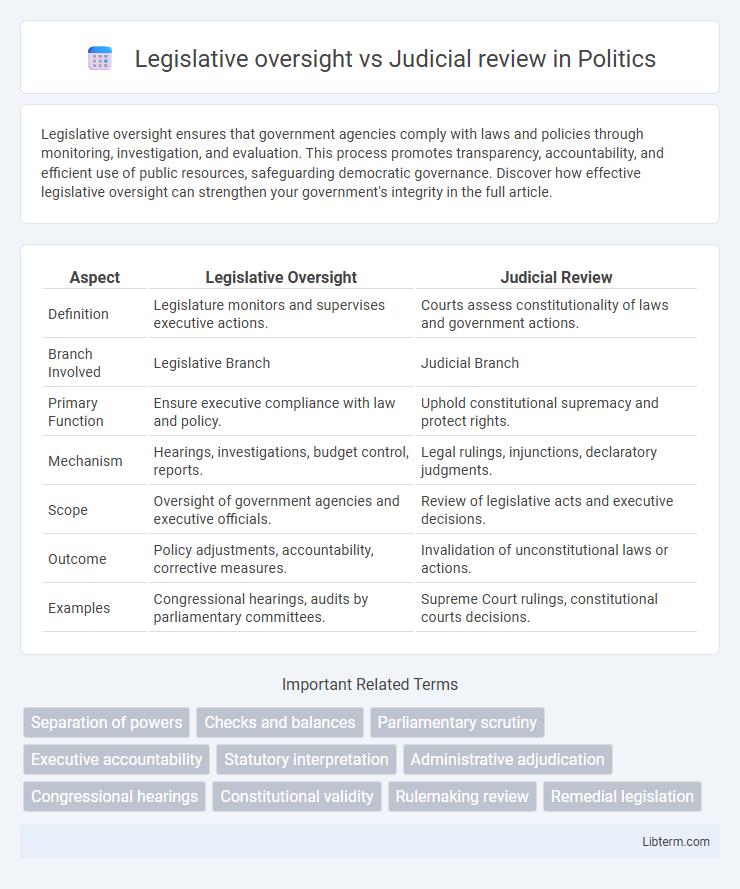Legislative oversight ensures that government agencies comply with laws and policies through monitoring, investigation, and evaluation. This process promotes transparency, accountability, and efficient use of public resources, safeguarding democratic governance. Discover how effective legislative oversight can strengthen your government's integrity in the full article.
Table of Comparison
| Aspect | Legislative Oversight | Judicial Review |
|---|---|---|
| Definition | Legislature monitors and supervises executive actions. | Courts assess constitutionality of laws and government actions. |
| Branch Involved | Legislative Branch | Judicial Branch |
| Primary Function | Ensure executive compliance with law and policy. | Uphold constitutional supremacy and protect rights. |
| Mechanism | Hearings, investigations, budget control, reports. | Legal rulings, injunctions, declaratory judgments. |
| Scope | Oversight of government agencies and executive officials. | Review of legislative acts and executive decisions. |
| Outcome | Policy adjustments, accountability, corrective measures. | Invalidation of unconstitutional laws or actions. |
| Examples | Congressional hearings, audits by parliamentary committees. | Supreme Court rulings, constitutional courts decisions. |
Introduction to Legislative Oversight and Judicial Review
Legislative oversight refers to the power of legislative bodies to monitor, investigate, and supervise executive branch activities to ensure compliance with laws and effective governance. Judicial review is the authority of courts to examine laws and governmental actions to determine their constitutionality, providing a critical check on legislative and executive powers. Both mechanisms reinforce the balance of power within government by holding public officials accountable and protecting constitutional principles.
Defining Legislative Oversight
Legislative oversight refers to the process by which legislative bodies monitor and evaluate the actions, policies, and administration of the executive branch and other government agencies to ensure compliance with laws and effective implementation of public policy. This function involves hearings, investigations, and budget reviews to hold the executive accountable and prevent abuses of power. Unlike judicial review, which allows courts to assess the constitutionality of laws and executive actions, legislative oversight operates through political and procedural mechanisms within the legislative framework.
Understanding Judicial Review
Judicial review is the power of courts, especially supreme or constitutional courts, to evaluate the constitutionality of legislative acts and executive actions, ensuring alignment with constitutional principles. This mechanism serves as a critical check on legislative and executive branches by invalidating laws or government decisions that violate constitutional provisions. While legislative oversight involves monitoring and controlling government actions through hearings and investigations, judicial review provides a legal and binding determination on constitutional compliance, reinforcing the rule of law.
Key Functions of Legislative Oversight
Legislative oversight is a critical function in the system of checks and balances, enabling legislatures to monitor and evaluate the execution of laws and the activities of the executive branch. It ensures accountability by scrutinizing government policies, expenditures, and administrative actions through hearings, investigations, and audits. This oversight mechanism complements judicial review, which focuses on evaluating the constitutionality of laws and executive actions.
Core Principles of Judicial Review
Judicial review centers on the judiciary's authority to assess the constitutionality of legislative acts and executive decisions, ensuring they comply with constitutional principles and protecting individual rights. It embodies core principles such as the supremacy of the constitution, the separation of powers, and the protection of fundamental rights through an independent judiciary. Legislative oversight, by contrast, involves the legislature's monitoring and evaluation of executive actions, primarily ensuring accountability and adherence to laws passed by the legislative body.
Comparative Analysis: Powers and Limitations
Legislative oversight involves the power of Congress or parliaments to monitor, supervise, and review executive branch actions, ensuring accountability and adherence to legislative intent through hearings, investigations, and budget controls. Judicial review is the authority of courts, particularly constitutional or supreme courts, to examine laws or executive acts for constitutionality and invalidate those conflicting with the constitution, serving as a check on legislative and executive powers. Limitations of legislative oversight include political constraints and limited enforcement mechanisms, while judicial review is constrained by judicial restraint, reliance on cases brought before the courts, and the judiciary's interpretative scope within constitutional boundaries.
Roles in Checks and Balances
Legislative oversight ensures the executive branch implements laws according to congressional intent, maintaining accountability through hearings, investigations, and budget controls. Judicial review empowers courts to interpret the constitutionality of laws and executive actions, upholding the rule of law by invalidating unconstitutional statutes. Together, these mechanisms balance power by enabling the legislature to monitor administration, while the judiciary safeguards constitutional limits.
Landmark Cases and Historical Examples
Legislative oversight is exemplified by the Watergate hearings of the 1970s, where Congress investigated executive branch abuses, reinforcing checks and balances. Judicial review, established in Marbury v. Madison (1803), grants the Supreme Court authority to invalidate laws contradicting the Constitution, shaping American legal precedent. The landmark case of United States v. Nixon (1974) demonstrated the interplay between legislative oversight and judicial review by limiting presidential privilege and affirming judicial power over executive actions.
Impact on Governance and Accountability
Legislative oversight enhances governance by enabling elected representatives to monitor and evaluate executive actions, thereby promoting transparency and accountability through budget approvals and policy scrutiny. Judicial review ensures that laws and executive actions comply with constitutional principles, safeguarding citizens' rights and maintaining the rule of law. Together, these mechanisms balance power by preventing abuses and reinforcing institutional accountability in democratic systems.
Contemporary Challenges and Future Perspectives
Legislative oversight faces challenges such as political polarization and limited resources, hindering effective monitoring of executive actions, while judicial review confronts issues like judicial activism debates and balancing constitutional interpretation with democratic principles. Emerging technologies and evolving governance models demand adaptive oversight mechanisms, with future perspectives emphasizing enhanced transparency, accountability, and collaboration between branches. Integrating artificial intelligence analytics and expanding public engagement can strengthen both legislative and judicial functions in safeguarding democratic governance.
Legislative oversight Infographic

 libterm.com
libterm.com